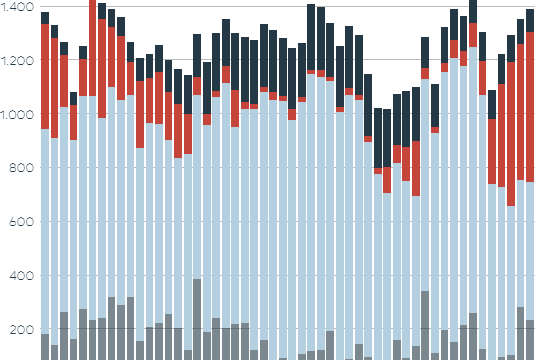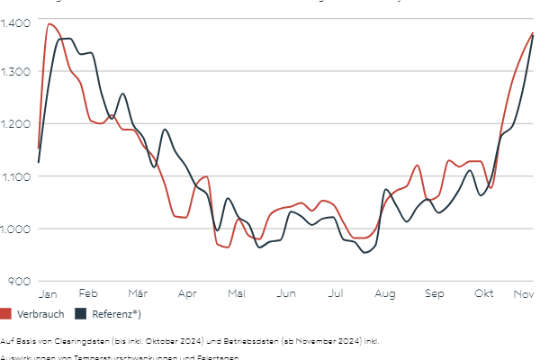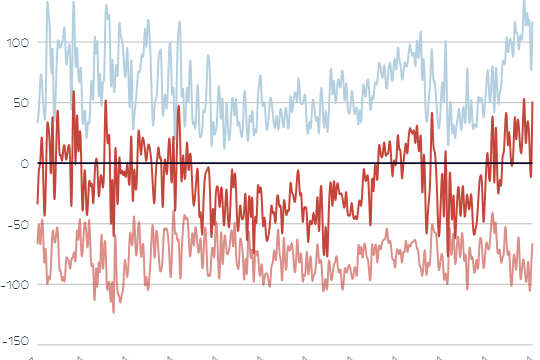APG: November figures show extremely high volatility of the electricity system
The APG factbox in November 2024 shows that the production from renewables almost halved in November compared to the previous month. Correspondingly, only 63 percent of the domestic electricity consumption could be covered by renewables.
November (calendar weeks 45-48) was characterized by a massive drop of about 46 percent in the production of renewable energies in comparison with the previous month. In November 2024, renewable production ranged around the average of the past seven years, although it fell by around 23 percent compared to November 2023. This means that renewable energies (3,275 GWh) were only able to cover 63 percent of the domestic electricity demand (5,179 GWh) in November, compared to 108 percent in October. These developments very obviously demonstrate the high volatility of today’s energy system.
Specifically, at 2,173 GWh, hydropower production - which was reduced due to seasonal factors - accounted for around 66 percent in November and thus contributed the lion's share of renewables. However, its share among renewable energies was still reduced by nine percent compared to November 2023. Wind energy contributed 711 GWh (+2 percent compared to November 2023) to the production of sustainable electricity, while the feed-in of PV facilities contributed 183 GWh (+4 percent compared to November 2023).
Decline in renewables production leads to a drop in exports.
Due to the reduced production from renewable energy sources, Austria was only able to export electricity on seven days in November. On balance, electricity imports totaled 486 GWh (based on the schedules). In comparison, Austria exported electricity on 14 days in November 2023, and, on balance, was an electricity exporting country over the course of the month with net exports of 44 GWh (based on the schedules).
No energy transition without a strong electricity grid
A strong grid is necessary to make the volatile, renewable electricity available and to transport it to where it is needed. To avoid grid overloads and ensure a secure supply, the electricity flow is managed with so-called redispatch measures, i.e. the targeted and controlled use of specific power plants.
In November interventions in the schedule of power plants in Austria were necessary on 18 days to ensure the security of the electricity supply. This is 1 day more than in November 2023. These interventions cause costs that eventually have to be borne by the electricity customers. By the end of November, these costs amounted to approx. 82.7 million euros.
A negative effect in addition to the costs and rising CO2 consumption is the "curtailment" of renewable power plant production: For example, wind power plants or run-of-river power plants that would be producing electricity at a certain time are shut down to avoid overloads in the electricity grid. Since the beginning of the year, an average of around 4, 863 MWh of electricity per month has been "lost" due to these measures (the total from January to November 2024 was around 53,496 MWh).
“The dynamics observed in the energy industry in November are a striking illustration of the volatility that inevitably goes hand in hand with an electricity system based on renewable energies. While Austria was still an exporting country on balance in November 2023, we became an importing country in November 2024, contrary also to the months of January to July and September and October 2024, in which Austria was consistently an exporting country. The volatility of the system requires the targeted use of thermal and hydraulic power plants, as well as the curtailment of renewables to prevent grid overloads, which underlines how urgent it is to expand our power grid. This is the fundamental precondition for achieving the energy transition without jeopardizing the security of supply, as well as for achieving the industry’s goals, and mitigating negative economic effects”, emphasizes Christoph Schuh, APG’s company spokesperson.
A high-capacity electricity infrastructure, storage facilities, and digital intelligence within the electricity system are necessary to fully capitalize on the planned growth rates of renewables in the coming years. APG's EUR 9 billion investment scheme up to 2034 and its timely implementation is therefore key for achieving the energy transition without jeopardizing the security of supply. “This requires favorable general circumstances including an appropriate overall system planning, the simplification and acceleration of approval procedures, and an Austria-wide coordination of the transformation process towards a sustainable and affordable energy system,” adds Christoph Schuh.
Energy exchange within Austria
The trans-regional electricity grid of APG facilitates the exchange of energy within the country. Electricity surpluses in individual provinces can thus be distributed throughout Austria to compensate for deficits.
In November, the highest volumes of energy were fed into the APG grid by Vorarlberg (160 GWh) and Burgenland (160 GWh) and thus made available throughout Austria. Carinthia (217 GWh) and Lower Austria (215 GWh) drew the most electricity from the APG grid.
Responsible energy consumption
The available data show that 5,179 GWh of electricity were consumed from the public grid in Austria in November (calendar weeks 45-48) - around four percent more than in November 2023 (5,002 GWh). This is the electricity drawn from the public grid in the APG control area. The figures do not include electricity produced and consumed by private PV units.
It is important to act responsibly when it comes to electricity consumption. Saving electricity reduces CO2 and overall systemic costs, which are significant contributions to increasing system security. The trend of reducing CO2 has to be pushed further. This also includes electricity from private PV units.
Tips for saving electricity can be found at www.apg.at/stromspartipps. With the APG Powermonitor, the Austrian population can see the most effective electricity-saving hours and thus make an active contribution to CO2 reduction and system security. The APG Powermonitor can be found at: www.apg.at/powermonitor.
APG continually keeps track of the development of the domestic electricity industry and regularly publishes diagrams at https://www.apg.at/infografiken regarding the topics: energy exchange, energy consumption in Austria, renewables production, import/export, electricity prices, etc.
Click here for the current infographics
About Austrian Power Grid (APG)
As independent transmission system operator Austrian Power Grid (APG) is in charge of ensuring the security of the electricity supply in Austria. With our high-performance and digital electricity infrastructure and the use of state-of-the-art technologies we integrate renewable energies, we are the platform for the electricity market, and we provide access to reasonably priced electricity for Austria’s consumers and thus create the basis for Austria as supply-secure and future-oriented industrial and business location and place to live. The APG grid totals a length of about 3,400 km and is operated, maintained, and continuously adapted to the increasing challenges of the electrification of businesses, industry, and society by a team of approximately 900 specialists. 67 substations are distributed all over Austria and the majority is operated remotely from APG’s control center in Vienna’s 10th district. Thanks to our committed employees Austria had a security of supply of 99.99 percent also in 2023 and thus ranks among the top countries worldwide. Our investments of 445 million euros in 2024 (2023: 490 million euros, 2022: 370 million euros) are a motor for the Austrian economy and a crucial factor in reaching Austria’s climate and energy targets. Until 2034 APG will invest a total of approximately 9 billion euros in grid expansion and renovation projects.
Press contact
Christoph Schuh



